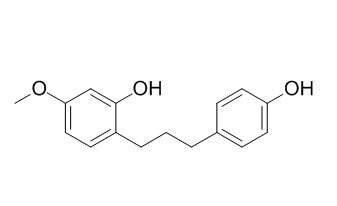Broussonin A
Broussonins A and B, new phytoalexins from diseased paper mulberry. Broussonin A shows estrogenic activity with ligand-binding activity of estrogen receptor, transcriptional activity of estrogen-responsive element-luciferase reporter genes. Broussonin A can significantly inhibit adipocyte differentiation in 3T3-L1 cells as measured fat accumulation using Oil Red O assay; it suppresses lipopolysaccharide (LPS)-stimulated inducible nitric oxide synthase (iNOS) expression at the transcriptional level through modulating NF-κB and down-regulation of the Akt and ERK signaling pathways.
Inquire / Order:
manager@chemfaces.com
Technical Inquiries:
service@chemfaces.com
Tel:
+86-27-84237783
Fax:
+86-27-84254680
Address:
1 Building, No. 83, CheCheng Rd., Wuhan Economic and Technological Development Zone, Wuhan, Hubei 430056, PRC
Providing storage is as stated on the product vial and the vial is kept tightly sealed, the product can be stored for up to
24 months(2-8C).
Wherever possible, you should prepare and use solutions on the same day. However, if you need to make up stock solutions in advance, we recommend that you store the solution as aliquots in tightly sealed vials at -20C. Generally, these will be useable for up to two weeks. Before use, and prior to opening the vial we recommend that you allow your product to equilibrate to room temperature for at least 1 hour.
Need more advice on solubility, usage and handling? Please email to: service@chemfaces.com
The packaging of the product may have turned upside down during transportation, resulting in the natural compounds adhering to the neck or cap of the vial. take the vial out of its packaging and gently shake to let the compounds fall to the bottom of the vial. for liquid products, centrifuge at 200-500 RPM to gather the liquid at the bottom of the vial. try to avoid loss or contamination during handling.
Molecules.2019, 24(11):E2044
J Med Food.2024, 27(9):844-856.
United States Patent Application2020, 20200038363
Appl. Sci.2020, 10(20), 7323.
BMC Complement Altern Med.2019, 19(1):325
Evid Based Complement Alternat Med.2021, 8855980.
Horticulturae2020, 6(4),76.
Food Chem.2020, 313:126079
Oxid Med Cell Longev.2021, 2021:4883398.
Univerzita Karlova2021, 20.500.11956.
Related and Featured Products
Chem Biodivers. 2014 May;11(5):749-59.
Suppression of inducible nitric oxide synthase expression by nyasol and broussonin A, two phenolic compounds from Anemarrhena asphodeloides, through NF-κB transcriptional regulation in vitro and in vivo.[Pubmed:
24827684]
Anemarrhena asphodeloides is widely used in traditional Chinese medicine, and is known to possess antidiabetic and anti-inflammatory properties.
METHODS AND RESULTS:
Because inducible nitric oxide synthase (iNOS) plays an important role in inflammation, we investigated the inhibitory effects of two known phenolic compounds, nyasol (1) and Broussonin A (2), from A. asphodeloides, on iNOS and its plausible mechanism of action. Compounds 1 and 2 exhibited inhibitory effects on nitric oxide (NO) production in lipopolysaccharide (LPS)-stimulated RAW 264.7 macrophage cells. Compounds 1 and 2 also suppressed the expressions of iNOS protein and mRNA. Moreover, compounds 1 and 2 suppressed the expression of inflammatory cytokines such as interleukin-1β (IL-1β) and interferon-β (IFN-β). They also inhibited the transcriptional activity of NF-κB and degradation of IκB-α, as well as the activation of Akt and ERK in LPS-stimulated RAW 264.7 cells. In in vivo animal model, compounds 1 and 2 significantly inhibited TPA-induced mouse ear edema.
CONCLUSIONS:
These results suggest that 1 and 2 suppress LPS-stimulated iNOS expression at the transcriptional level through modulating NF-κB and down-regulation of the Akt and ERK signaling pathways. Taken together, these findings indicate that the suppressive effects of 1 and 2 on iNOS expression might provide one possible mechanism for their anti-inflammatory activities.
Bioorg Med Chem Lett. 2010 Jun 15;20(12):3764-7.
New estrogenic compounds isolated from Broussonetia kazinoki.[Pubmed:
20493686 ]
METHODS AND RESULTS:
Two new and two known compounds were identified as estrogenic constituents from Broussonetia kazinoki. Their structures were elucidated as Broussonin A (1), tupichinol C (2), kazinol U (3), and (+)-(2R) kazinol I (4).
CONCLUSIONS:
They showed estrogenic activity with ligand-binding activity of estrogen receptor, transcriptional activity of estrogen-responsive element-luciferase reporter genes. They also control the cellular gene expression levels of estrogen-responsive genes. Phytoestrogens from B. kazinoki may have beneficial effects in the treatment of menopausal symptoms.
Bioorg Med Chem Lett. 2012 Apr 15;22(8):2760-3.
A new pancreatic lipase inhibitor from Broussonetia kanzinoki.[Pubmed:
22450131]
METHODS AND RESULTS:
A new phenolic compound, broussonone A (1) were isolated from the stem barks of Broussonetia kanzinoki (Moraceae), together with two diphenylpropanes, Broussonin A (2), broussonin B (3), two flavans, 7,4'-dihydroxyflavan (4), 3',7-dihydroxy-4'-methoxyflavan (5), and two flavones, 3,7-dihydroxy-4'-methoxyflavone (6), 3,7,3'-trihydroxy-4'-methoxyflavone (7).
CONCLUSIONS:
Compound 1 showed noncompetitive inhibitory activity on pancreatic lipase with an IC(50) of 28.4 μM. In addition, compounds 1-5 significantly inhibited adipocyte differentiation in 3T3-L1 cells as measured fat accumulation using Oil Red O assay.
Chemistry Letters,1980,3(3):339-340.
Broussonins A and B, new phytoalexins from diseased paper mulberry.[Reference:
WebLink]
METHODS AND RESULTS:
Isolation and structure elucidation of two phytoalexins (1 and 2), produced by diseased paper mulberry and designated as Broussonin A and broussonin B, are described.
CONCLUSIONS:
These phytoalexins are characterized structurally by a 1,3-diphenylpropane skeleton.



